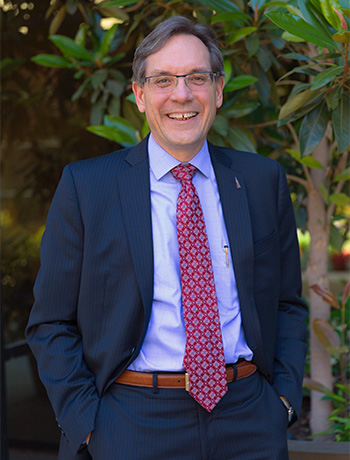Tailoring financial solutions for everyday Americans

Robert Pugh • Portland, OR
Transamerica Financial Advisors, Inc. • Transamerica Financial Group Division
Read full biography below
It was an interesting time in my life. I had spent about 17 years in the fashion and retail industry and had reached a position with significant responsibility. At that point I was managing a five-state area. The retail industry was consolidating, moving away from the specialty retailing segment where I had built up my expertise. It was time for me to move on and find a second career.
I investigated a lot of options and decided financial services represented a great opportunity in a growth sector. I explored different firms and was looking for a company that was a good fit culture-wise for me and had a value system that I respected. I also wanted a firm that could provide the training, resources, structure, and team atmosphere that would allow me to move steadily toward building a practice and achieving financial stability in my new career. I found all of that at one of the predecessor companies that is now part of TFA.
Though our corporate structure has seen change over the years, I think everything has worked out, and I feel blessed with how my career path has evolved. I had some terrific mentors when I first started, and that has come full circle with my mentorship of people coming into the business. One of the great attributes of my office is the focus on training and a team-oriented approach. Those attributes match up well with my personality and business style. At the end of the day, our business is about people. It’s about helping people, listening to people, and communicating with people, which includes both our internal team and our clients.
Has your planning and investment philosophy evolved since you entered the industry?
It has, but more so on the investment side. I joined our group in 1997 and became full-time and fully licensed in 1998. Financial markets had seen a period of very good growth, and our investment philosophy at that time was pretty classic asset allocation and modern portfolio theory. Generally, we would use a family of mutual funds or a fund-of-funds platform.
“Working with professional money managers allows for a portfolio to be managed according to a client’s specific risk tolerance.”
Our overall perspective in guiding clients remains similar today, but we use much more sophisticated tools. We start with a full financial review of a client or client family, from cash flow analysis to debt management to college planning to emergency funds. Then we complete a review of insurance coverages, including life, health, long-term care, and disability. We also analyze what they are doing for their long-term retirement savings, implications for their current and future tax situation, and whether or not they should be seeking assistance with estate planning.
We continue to do these complete reviews, report our findings to the client, and make holistic preliminary recommendations regarding areas that might need to be addressed. Assuming the client is in agreement with our assessment, we then move into making specific recommendations.
The major change in the way we work from an investment perspective came following the dot-com recession and market crash. This was really an epiphany moment for our organization. While many senior advisors had lived through several bear markets before, the suddenness and ferocity of this market crash was very different. Frankly, portfolios that had been well-diversified and classically constructed still took a major hit. This impacted many clients, and we went through an intense re-evaluation period. First, we determined the most appropriate course of action for the long-term investment planning of our current clients. Then we began to re-evaluate how we approached portfolio construction, risk management, and investment strategies in general—all with a goal of trying to mitigate the impact of large market downturns.
Where did the evaluation take your investment thinking and approach to client portfolios?
During the evaluation, the seeds were planted for moving toward more active management of client portfolios. Senior advisors in the organization started to research third-party active management that focused on risk-managed strategies and how these resources could be brought to average Americans. We just could not envision our clients having to live through this kind of trying circumstance again. A market crash of this magnitude not only affected most portfolio asset classes, it also impacted variable life and variable annuity products held by clients.

By 2006 our organization began introducing active management to client portfolios. The advisor community was being introduced to active management at various meetings and presentations, and I recall walking away very impressed. To my mind, active management was the way of the future and was becoming a necessity for clients’ portfolios. Though the markets had largely recovered, we all knew that it was only a matter of time until the market cycle turned to another bear market. I was very passionate about bringing this concept to clients, understanding the mathematical power that avoiding large drawdowns can have for a client portfolio. My client-education efforts include a review of that type of math: the fact that it takes a 43% gain in the equity portion of a portfolio to recover from a 30% loss.
Our philosophy around third-party active management has grown to be an important part of our investment approach. Managing money and managing relationships are really two separate tasks. If you have a client base of any significant size, it is extremely difficult to do both well. In fact, I am hard-pressed to believe that any individual advisor can replicate the type of capabilities we have in our third-party money managers, who are experts at the strategies they develop and manage.
I view my position as a holistic advisor, guiding clients in their overall planning needs—including their investments—and toward an investment plan that is an appropriate fit for their risk profile and their goals. I work diligently during this process, conduct appropriate reviews, and monitor clients’ progress toward their objectives, recommending adjustments as life circumstances change or a portfolio requires modifications. As part of this role, I closely monitor the performance of our various money managers, a responsibility I take seriously.
Part of the education process is explaining our fee structure to clients. Our office has embraced the fee-based advisory model, and I believe that works well for all parties. I explain to clients that we generally do not work for commissions and that we are on the same side of the table in evaluating investment recommendations suitable for their needs. We explain that we may work with highly professional third-party managers on their behalf who, of course, have to be compensated for their efforts.
However, I believe the long-term benefits of professional money management for clients in terms of the growth and protection of their assets are significant. We have now lived through two major market downturns this century. We know we will have difficult markets again in the future—we just don’t know when or how severe. Working with professional money managers allows for a portfolio to be managed according to a client’s specific risk tolerance. We work with several outside managers, have many strategies at our disposal, and a great deal of flexibility in portfolio construction. We can diversify by managers and by strategies.
Further, by definition, actively managed strategies are continually watched by professionals and can adjust to different market conditions. Managers can make changes according to predetermined guidelines when they see changes in overall market trends, in asset classes, or in specific sectors. Every strategy is different, with some having the ability to move to 100% cash if their models so dictate, and some have other defensive tactics. The key is that risk management is an important component for most of the active strategies that we use on behalf of clients.
But I also explain to clients that risk management can be a trade-off. We would not expect to outperform a broad index in a strong bull market, but we also would not expect to see the types of drawdowns that the S&P 500 has experienced over the years. I try to establish mutual expectations for a portfolio overall—not all strategies perform well in all types of market conditions. And for certain clients, we might recommend a blend of active and passive strategies. We communicate what we expect out of a portfolio strategy and then closely monitor that it is delivering on those expectations. We will make changes if strategies are not performing as they should.
I am very proud that we can bring sophisticated investment strategies to clients all across the risk spectrum. And, with account minimums now relatively low, clients do not need to have large portfolio balances to take advantage of managed accounts. It is very satisfying to be able to bring these types of products and services to everyday Americans.
 Robert Pugh is an investment advisor representative with Transamerica Financial Advisors, Inc. (TFA), based in the Portland, Oregon, area. Mr. Pugh has over two decades of experience in the financial-services industry and focuses on individuals and families seeking financial guidance, insurance and investment strategies, and tax-advantaged products and services. He also works with small-business owners on overall financial needs and 401(k) services.
Robert Pugh is an investment advisor representative with Transamerica Financial Advisors, Inc. (TFA), based in the Portland, Oregon, area. Mr. Pugh has over two decades of experience in the financial-services industry and focuses on individuals and families seeking financial guidance, insurance and investment strategies, and tax-advantaged products and services. He also works with small-business owners on overall financial needs and 401(k) services.
Mr. Pugh grew up in the Black Hills of South Dakota and first pursued a 17-year retailing career that led to positions of increasing management responsibility and supervision of several retail territories across the western United States. He later transitioned to the financial industry and says he receives a great deal of satisfaction in “providing financial products and services to clients and their families.” Mr. Pugh believes that “people from all walks of life deserve access to 21st-century financial guidance and investment approaches.”
Married for close to 40 years, Mr. Pugh and his wife enjoy fine wine, cooking, and travel. They have taken several walking tours in Europe and “look forward to taking many more trips abroad.” Mr. Pugh is active in Toastmasters International, where he has held officer positions in the local Oregon chapter. He also serves his faith community in several capacities.
Disclosure: Robert Pugh is a Registered Representative and an Investment Advisor Representative with Transamerica Financial Advisors Inc. (TFA). Securities and Investment Advisory Services offered through TFA, Transamerica Financial Group Division, member FINRA, SIPC, and a Registered Investment Advisor. Non-securities products and services are not offered through TFA. Tax and/or legal advice not offered by Transamerica Financial Advisors, Inc., Transamerica Financial Group Division or their affiliated companies. Please consult with your personal tax professional or legal advisor for further guidance on tax or legal matters. TFG009377-08/16
Photography by Joni Kabana



